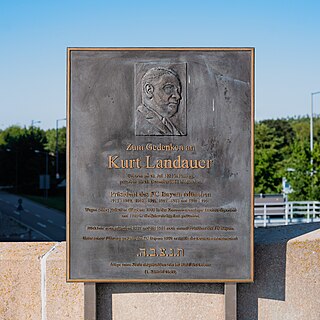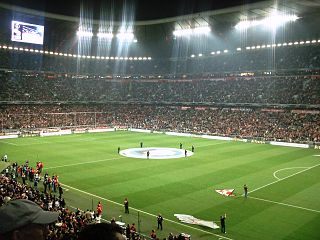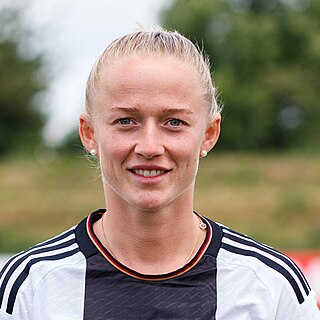Related Research Articles

Kurt Landauer was a German football official. His profession was often listed as Kaufmann ("merchant"), he was head of the advertising department of the major Munich daily newspaper Münchner Neueste Nachrichten, considered a precursor to Süddeutsche Zeitung, which commenced publication after World War II. His claim to fame is his four tenures as the president of the football club FC Bayern Munich between 1913 and 1951. To date, he remains the president with the longest time in office.
Egon Coordes is a German former professional football player and coach.

A Gauliga was the highest level of play in German football from 1933 to 1945. The leagues were introduced in 1933, after the Nazi takeover of power by the National Socialist League of the Reich for Physical Exercise.

Jan Tilman Kirchhoff is a German former professional footballer who played as a centre-back or defensive midfielder.

The Munich derby is the name given to football matches between Bayern Munich and 1860 Munich, both of them from Munich, Germany.
The 2012–13 1. FC Kaiserslautern season was the 113th season in club history. In 2012–13 the club played in the 2. Fußball-Bundesliga, the second tier of German football. It was the club's first season back in this league, after it was relegated from the Fußball-Bundesliga in 2012. They were denied an instant return to the top flight after finishing 3rd and losing in the relegation play-offs to TSG 1899 Hoffenheim 5–2 on aggregate.
The 1959–60 Eintracht Frankfurt season was the 60th season in the club's football history. In 1959–60 the club played in the Oberliga Süd, the top tier of German football. It was the club's 15th season in the Oberliga Süd.
The 2016–17 DFB-Pokal was the 74th season of the annual German football cup competition. Sixty-four teams participated in the competition, including all teams from the previous year's Bundesliga and the 2. Bundesliga. It began on 19 August 2016 with the first of six rounds and ended on 27 May 2017 with the final at the Olympiastadion in Berlin, a nominally neutral venue, which has hosted the final since 1985. The DFB-Pokal is considered the second-most important club title in German football after the Bundesliga championship. The DFB-Pokal is run by the German Football Association (DFB).

The 1933–34 Gauliga Bayern was the inaugural season of the league, one of the 16 Gauligas in Germany at the time. It was the first tier of the football league system in Bavaria (German:Bayern) from 1933 to 1945. The Gauliga Bayern had replaced the Bezirksliga Bayern which had been played in two divisions, north and south, as the top tier of football in Bavaria at the end of the 1932–33 seasons.
The 1932–33 Bezirksliga Bayern was the tenth and last season of the league, one of the eight Bezirksligas in Southern Germany at the time. It was the first tier of the football league system in Bavaria (German:Bayern) from 1923 to 1933. The league was organised in two regional divisions, north and south, with the best two teams from each qualified for the Southern German championship.
The 2017–18 Bundesliga was the 55th season of the Bundesliga, Germany's premier football competition. It began on 18 August 2017 and concluded on 12 May 2018. The fixtures were announced on 29 June 2017.

The 2018 DFL-Supercup was the ninth edition of the German super cup under the name DFL-Supercup, an annual football match contested by the winners of the previous season's Bundesliga and DFB-Pokal competitions. The match was played on 12 August 2018.
The 2018–19 Bundesliga was the 56th season of the Bundesliga, Germany's premier football competition. It began on 24 August 2018 and concluded on 18 May 2019. It also marked the first season without Hamburger SV, previously the only team to have played in the top tier of German football in every season since the end of World War I.
The 1981–82 Eintracht Frankfurt season was the 82nd season in the club's football history. In 1981–82 the club played in the Bundesliga, the top tier of German football. It was the club's 19th season in the Bundesliga.

Lea Schüller is a German professional footballer who plays as a forward for Frauen-Bundesliga club Bayern Munich and the Germany national team.
The 2019–20 FC Bayern Munich season was the 121st season in the football club's history and 55th consecutive and overall season in the top flight of German football, the Bundesliga, having been promoted from the Regionalliga in 1965. Bayern also participated in this season's edition of the domestic cup, the DFB-Pokal, and the premier continental cup competition, the UEFA Champions League. As a result of winning the prior season's Bundesliga and DFB-Pokal, they took part in the German super cup, the DFL-Supercup, as well.
Udo Klug was a German football midfielder and later manager.
The 1976–77 Eintracht Frankfurt season was the 77th season in the club's football history. In 1976–77 the club played in the Bundesliga, the top tier of German football. It was the club's 14th season in the Bundesliga.
The 2021–22 Bundesliga was the 59th season of the Bundesliga, Germany's premier football competition. It began on 13 August 2021 and concluded on 14 May 2022. The fixtures were announced on 25 June 2021.
References
- ↑ ""Wir waren die Juddebube" Eintracht Frankfurt in der NS-Zeit" [»We were the Jewish boys« Eintracht Frankfurt during the Nazi era]. werkstatt-verlag.de (in German). Retrieved 10 June 2016.
- ↑ Frankfurter Eintracht und FSV: 1933 endet eine "gute Ära" [Frankfurter Eintracht and FSV: 1933 ended a "good era"] (in German). Bundesinstitut für Sportwissenschaft. 2003. ISBN 9783895334078 . Retrieved 12 June 2016.
{{cite book}}:|website=ignored (help) - ↑ Oswald, Rudolf (2021). "The image of the "Judenklub" in interwar European soccer". In Brunssen, Pavel; Schüler-Springorum, Stefanie (eds.). Football and Discrimination. Routledge. pp. 37–46. doi:10.4324/9780429341014. ISBN 9780429341014.
- ↑ "Angegriffene Identität: der "Judenklub" Tottenham Hotspur" [Attack on identity: the „Judenklub“ Tottenham Hotspur]. publikative.org (in German). Der Spiegel. 6 March 2013. Archived from the original on 8 April 2016. Retrieved 10 June 2016.
- ↑ "Antisemitismus im Fußball" [Antisemitism in football]. fussball-gegen-nazis.de (in German). 28 March 2008. Retrieved 10 June 2016.
- ↑ "Antisemitisme in België" [Antisemitism in Belgium]. antisemitisme.be (in Dutch). 3 March 2018. Retrieved 5 January 2018.
- ↑ Tait, Robert (4 November 2018). "Racist fans get Jewish history lesson as rival Prague teams clash". The Guardian . Retrieved 9 May 2023.
- ↑ Oswald, Rudolf (2021). "The image of the "Judenklub" in interwar European soccer". In Brunssen, Pavel; Schüler-Springorum, Stefanie (eds.). Football and Discrimination. Routledge. pp. 37–46. doi:10.4324/9780429341014. ISBN 9780429341014.
- ↑ Rundfunk, Bayerischer (12 August 2015). "Schwere Zeiten für den "Judenklub"" [Difficult times for the Jewish club]. bpb.de (in German). Bayerischer Rundfunk . Retrieved 10 June 2016.
- 1 2 Honigstein, Raphael (13 May 2012). "Bayern Munich embrace anti-Nazi history after 80 years of silence". The Guardian . Retrieved 10 June 2016.
- ↑ Warmbrunn, Benedikt (27 January 2015). "Zwischen Saudi-Arabien und "Judenklub"" [Between Saudi-Arabia and "Judenklub"]. Sueddeutsche.de (in German). Sueddeutsche Zeitung . Retrieved 10 June 2016.
- ↑ Fischer, Sebastian (29 July 2009). "Bayern Münchens jüdischer Meistermacher" [Bayern Munichs Jewish championship winner]. Spiegel Online (in German). Der Spiegel . Retrieved 10 June 2016.
- ↑ "Fußball unterm Hakenkreuz" [Football under the Swastika]. ballesterer.at (in German). 10 March 2008. Archived from the original on 30 January 2016. Retrieved 10 June 2016.